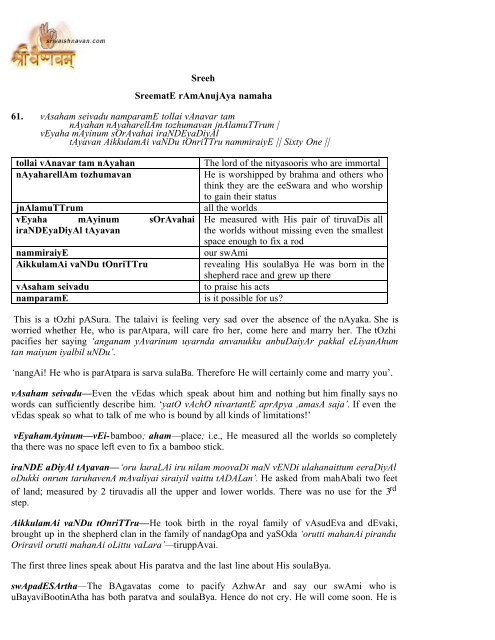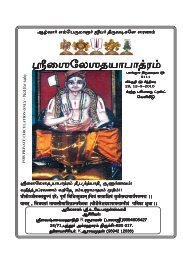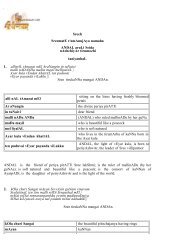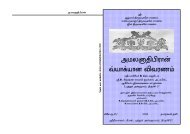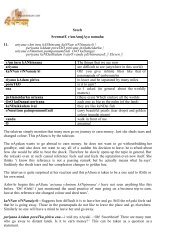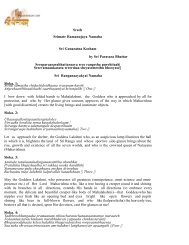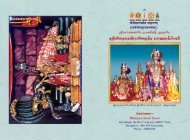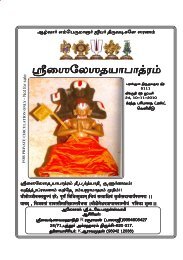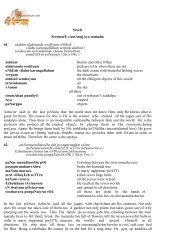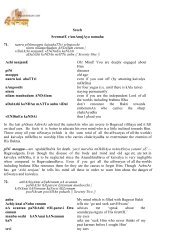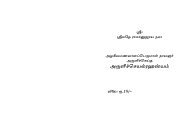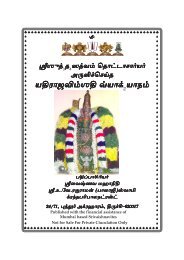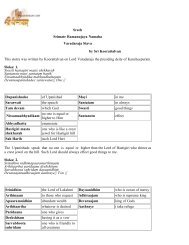Tiruviruttam7 - Srivaishnavan
Tiruviruttam7 - Srivaishnavan
Tiruviruttam7 - Srivaishnavan
You also want an ePaper? Increase the reach of your titles
YUMPU automatically turns print PDFs into web optimized ePapers that Google loves.
Sreeh<br />
SreematE rAmAnujAya namaha<br />
61. vAsaham seivadu namparamE tollai vAnavar tam<br />
nAyahan nAyaharellAm tozhumavan jnAlamuTTrum |<br />
vEyaha mAyinum sOrAvahai iraNDEyaDiyAl<br />
tAyavan AikkulamAi vaNDu tOnriTTru nammiraiyE || Sixty One ||<br />
tollai vAnavar tam nAyahan<br />
nAyaharellAm tozhumavan<br />
jnAlamuTTrum<br />
vEyaha mAyinum sOrAvahai<br />
iraNDEyaDiyAl tAyavan<br />
nammiraiyE<br />
AikkulamAi vaNDu tOnriTTru<br />
vAsaham seivadu<br />
namparamE<br />
The lord of the nityasooris who are immortal<br />
He is worshipped by brahma and others who<br />
think they are the eeSwara and who worship<br />
to gain their status<br />
all the worlds<br />
He measured with His pair of tiruvaDis all<br />
the worlds without missing even the smallest<br />
space enough to fix a rod<br />
our swAmi<br />
revealing His soulaBya He was born in the<br />
shepherd race and grew up there<br />
to praise his acts<br />
is it possible for us?<br />
This is a tOzhi pASura. The talaivi is feeling very sad over the absence of the nAyaka. She is<br />
worried whether He, who is parAtpara, will care fro her, come here and marry her. The tOzhi<br />
pacifies her saying ‘anganam yAvarinum uyarnda anvanukku anbuDaiyAr pakkal eLiyanAhum<br />
tan maiyum iyalbil uNDu’.<br />
‘nangAi! He who is parAtpara is sarva sulaBa. Therefore He will certainly come and marry you’.<br />
vAsaham seivadu—Even the vEdas which speak about him and nothing but him finally says no<br />
words can sufficiently describe him. ‘yatO vAchO nivartantE aprApya ,amasA saja’. If even the<br />
vEdas speak so what to talk of me who is bound by all kinds of limitations!’<br />
vEyahamAyinum—vEi-bamboo; aham—place; i.e., He measured all the worlds so completely<br />
tha there was no space left even to fix a bamboo stick.<br />
iraNDE aDiyAl tAyavan—‘oru kuraLAi iru nilam moovaDi maN vENDi ulahanaittum eeraDiyAl<br />
oDukki onrum taruhavenA mAvaliyai siraiyil vaittu tADALan’. He asked from mahAbali two feet<br />
of land; measured by 2 tiruvadis all the upper and lower worlds. There was no use for the 3 rd<br />
step.<br />
AikkulamAi vaNDu tOnriTTru—He took birth in the royal family of vAsudEva and dEvaki,<br />
brought up in the shepherd clan in the family of nandagOpa and yaSOda ‘orutti mahanAi pirandu<br />
Oriravil orutti mahanAi oLittu vaLara’—tiruppAvai.<br />
The first three lines speak about His paratva and the last line about His soulaBya.<br />
swApadESArtha—The BAgavatas come to pacify AzhwAr and say our swAmi who is<br />
uBayaviBootinAtha has both paratva and soulaBya. Hence do not cry. He will come soon. He is
ASrita sulaBa. ‘karuvasam illadavan pirappau eDuttalum adilum arivillAmaikku ellai nilamAna<br />
eLiya kulattinanAdlaum enna Achchariyam’ AzhwAr in His tiruvAimozhi says ‘pirandavArum’<br />
and ettiram’ once can only say ‘ettiram’ and stay dumb founded.<br />
62. iraiyO irakkinum eengOr peN pAlenavum irangAdu<br />
araiyO ena ninradirum karungaDal eengivaL tan |<br />
niraiyO iniyum tiruvaruLAlanri kApparidAl<br />
muraiyO aravaNai mEr paLLikoNDa muhil vaNNanE || Sixty Two ||<br />
irakkinum yO<br />
Or peN pAlenavum eengu irai irangAdu<br />
karungaDal<br />
araiyO ena ninru adirum<br />
Oh!<br />
aravaNai mEl paLLikoNDa muhil<br />
vaNNanE<br />
eengu<br />
ivaL tan niraiyO<br />
ini um tiruvaruLAlanri<br />
kApparidAl<br />
muraiyO<br />
However much she pleads<br />
this dark sea does not have any mercy over<br />
her as a woman<br />
but roars with great noise as if challenging<br />
for a fight<br />
Alas! How cruel!<br />
Oh! kALamEGasyAma! you lie on the cozy<br />
bed of AdiSESha!<br />
here<br />
this girl’s good nature is<br />
without your anugraha<br />
no one can save her<br />
is it right on your part to neglect Her?<br />
The tOzhi talks about the nAyaki’s condition. Her agony increases manifold if she hears the roar<br />
of the sea and says ‘I have been so far controlling her somehow; It cannot do it anymore. Only<br />
the nAyaka should save her’.<br />
It is but natural to pity someone suffering from an illness; especially so in case of a woman. More<br />
so if she young and tender. This karungaDal is very cruel it does not take pity on her.He<br />
purposely makes loud noise to increase her suffering.<br />
karungaDal—He is dark both inside and outside.<br />
karungaDal—Can be interpreted also as ‘angry sea’.<br />
ivaLtan—She who is totally incapable of taking care of herself.<br />
nirai—modesty, quiet, clam.<br />
ini—She had been pining for him since a long time. Now her condition is worse than before.<br />
Hereafter she wont be able to take care of herself.<br />
un tiruvaruLAl anri kApparidu—Therefore her only savior is You alone. If you come here and<br />
satisfy her desire she will be completely all right. But, Alas! you don’t seem to bother about her.<br />
aravaNaimEr paLLikkoNDa—You lie comfortable the soft bed of tiruvanandAzhwAn whereas<br />
she lies on this hard surface not getting a wink of sleep!<br />
muhil vaNNanE—You are called muhil vaNNan since you help others without expecting results.<br />
you should not act like this towards her! It isn’t proper for you to do that.<br />
swApadESArtha—AzhwAr is already feeling very sad because He could not get Bagavat<br />
samslESha. Now the samsAra sAgara too torments him more. AzhwAr feels sadder after hearing<br />
the tumult and turbulence of the samsAra sAgara. The BAgavatas pray to him who is called<br />
karuNA sAgara to alleviate his suffering. Only He can do the miracle.
Or peNpAl enavum eengu irai irangAdu—The samsAra sAgara torments him not withstanding<br />
His pAratantrya.<br />
karungaDal—The terrible samsAra sAgara. un tiruvaruLAl anri kApparidu—Only you can save<br />
him by Your anugraha. aravaNaimEl paLLikkoNDa—emberumAn always receives the<br />
kainkarya from the chEtana called AdiSESha. AzhwAr too desires to do suchkainkaryas. For<br />
this he needs His anugraha. The BAgavatas speak on his behalf to emberumAn.<br />
63. vaNNam sivanduLa vAnADamarunguLir vizhiya<br />
taNmen kamalattaDam pOl polindana tAmivaiyO |<br />
kaNNan tirumAl tirumuhantannoDu kAdal seidErrku<br />
eNNam puhundu aDiyEnoDikkAlam irukkinravE || Seventy Three ||<br />
vaNNam sivanduLa<br />
vAn nADuamarum kuLir vizhiya<br />
taNmen kamalattaDam pOl polindana<br />
ivaiyOtAm<br />
kaNNan<br />
tirumAl<br />
tirumuhantannoDu kAdal seidErrku<br />
eNNam<br />
puhundu<br />
ikkAlam<br />
aDiyEnoDu irukkinra<br />
Red in colour<br />
having pleasing look which brings Ananda to<br />
the people of paramapada<br />
These eyes look like the lotus in the pond<br />
having characteristic like lool, fresh soft<br />
He who took kriShNAvatAra<br />
the consort of SreedEvi<br />
in my mind which thirsts for His tirumuKa<br />
maNDalam (beautiful face)<br />
He entered now<br />
now<br />
they are with me (they don’t leave me)<br />
In this pASura the nAyaki refutes the charges against the nAyaka expressed by the tOzhi.<br />
Whenever the nAyaki was feeling dejected due to the absence of the nAyaka, the tOzhi used to<br />
praise him, defend His actions, only to pacify her. Now she blames him and advises the nAyaki<br />
not to pine for such a man.<br />
The nAyaki, however, reproaches her for such words. ‘ippozhudum avanadu kaNgaL en nenjilum<br />
kaNNilum tOnri neengAdu irukkinrana; inganam anbODu aNiyanAyuLLAvanai, anAdaram seidu<br />
pirindu senrAn enru nee koDumai kooruhinradu ennO?’—says the talaivi.<br />
taN mel kamala taDam pOl polindana ivaiyO tAm—His tirukkaNgaL are as pleasant and<br />
beautiful as red lotuses. They entered my mind when i entertained a desire for His tirumuKa<br />
maNDala. they are still with me. Oh! tOzhi! Why do you unnecessarily blame him?<br />
vaNNam sivanduLa—His eyes are red because of His love for me. tOzhi—‘i think they are red<br />
due to anger!’ ‘No. ‘vAnADamarum kuLir vizhiya’.<br />
His eyes are kuLir vizhi. Therefore the redness is not due to anger as you say. It is because of<br />
love towards me’.<br />
tAm ivaiyO—ivai—refers to direct perception by her. This is due to her constant thinking of him.<br />
aDiyEnODu ikkAlam irukkinravE—He is in my mind and eyes even today. They have never left<br />
me. Therefore don’t blame him saying He doesn’t love me. A chaste woman never blames her<br />
husband even in His absence.<br />
swApadESArtha—Some BAgavatas, out of love for AzhwAr, blame BagavAn who is the cause<br />
for this state of AzhwAr. To them AzhwAr applies—‘you are wrong. His paripoorNa anugraha is<br />
always with me. He is in my heart and eyes’.
64. irukkAr mozhiyAl neriyizhukkAmai ulahaLanda<br />
tiruttALiNai nilattEvar vaNanguvar yAmumavA |<br />
orukkA vinaiyoDum emmoDum nondu kaniyinmaiyil<br />
karukkAi kaDippavar pOl tirunAmasol kaTTranamE || Sixty Four ||<br />
nilattEvar<br />
irukkAr mozhiyAl<br />
neriyizhukkAmai<br />
ulahaLanda tiruttALiNai vaNanguvar<br />
yAmum<br />
avA orukkA<br />
vinaiyoDum emmoDum nondu<br />
kaniyinmaiyil karukkAi kaDippavar pOl<br />
tirunAmasol kaTTranamE<br />
The brAmaNas who are called the dEvas of<br />
earth<br />
with vEdic mantras<br />
duly<br />
worship the tiruvaDi of him who measured<br />
all the worlds<br />
we too<br />
cannot control our minds<br />
we blame our pApa karmas (which become<br />
the virOdhi) and ourselves too (who did the<br />
pApa karmas)<br />
like those who eat raw fruits when ripes ones<br />
are not available<br />
we chant the tirunAmas (to sustain our lives<br />
till we got His poorNAnuBava)<br />
The nAyaki tells her tOzhi that she sustains her life by chanting His names. This is what the<br />
nayakis usually do when they are away form the nayakas.<br />
The brAhmaNas who have done lot of puNya karmas always chant vEda mantras and experience<br />
Bagavad viShaya. But since I am a mahApApi I don’t enjoy His company. That is why I chant<br />
His names and forget my sorrow. It is like a person eating raw unripe fruits when He does not<br />
get ripe furits. I don’t get poorNAnuBava of emberumAn. Hence I satisfy myself by chanting His<br />
names. Is this a satisfying substitute for one like me who want to hug him and gaze at him?<br />
irukkAr mozhi—puruShasooka etc (or) irukku—vEdas Ar—that contains in a seed form<br />
mozhi—the aShTAkShara mantra. ;rchO yajaoomShisAmAni tathaivAtharvaNAni cha! sarvam<br />
aShTAkSharAnthastham yachchAnyadapi vAngmayam’.<br />
nei izhukkAmai—Doing proper worship in a befitting manner without omitting any details.<br />
ulahaLanda—sarva sulaBa.<br />
nilattEvar—‘BoosurAh’—As the indrAdi dEvas are to swarga lOka, the vaidika brAhmaNas are<br />
to this BoolOka.<br />
vinaiyODum emmODum nondu—i detest myself for all the sins i have committed in many<br />
janmas which act now as pratibandha (obstacle) preventing my samslESha with him.<br />
kani inmaiyil karukkAi kaDippavar pOl—karukkAi—Raw unripe fruit, kani—ripe fruit. Like<br />
one who cannot afford if ripe fruit eats raw unripe one, i am satisfied in nAmasankeertana alone.<br />
swApadESArtha—AzhwAr who received the nirhEtuka kaTAkSha (mayarvara madi nalam)<br />
from emberumAn who is ayarvarum amararhaL adhipadi, speaks himself as the most unfit<br />
person (because He compass himself with the supreme Lord and feels He is very low)<br />
irukku—rigvEda (or) a common name for all the vEdas.<br />
yAmumavA—If read as ‘avvA’ it means ‘Am i like that?’ Am i that fortunate as the nilattEvar to<br />
worship His tiruvaDi? No. definitely not.
65. kaTTruppiNaimalar kaNNin kulam venru OrO karumam<br />
uTTruppayinru sEviyoDusAvi ulahamellAm |<br />
muTTrum vizhungi umizhnda pirAnAr tiruvaDikkeezh<br />
uTTrum urAdum milLarnda kaNNAi emmai uNhinravE || Sixty Five ||<br />
kanru piNai<br />
malar kaNNin<br />
kulam venru<br />
OrO karumam uTTru<br />
payinru<br />
sEviyoDusAvi<br />
uTTrum urAdum milLarnda kaNNAi<br />
ulahamellAm muTTrum vizhungi<br />
umizhnda pirAnAr tiruvaDikkeezh<br />
emmai uNhinravE<br />
Young doe’s<br />
broad eyes<br />
defeating the group (of deer)<br />
fixing oneself in an action<br />
acquiring mastery over it<br />
discussing the action with the ears<br />
the eyes helping me and offending one<br />
alternately<br />
under the tiruvaDi of emberumAn who<br />
swallowed and spat all the worlds<br />
pull me (towards them)<br />
The nAyaka admires her eyes, look and describes them to His friend. Some commentators say<br />
this pASura is talaivan pASura addressing His mind. ‘talaimahaL nOkkilE eeDuppaTTa<br />
talaimahan ekkaNgaL tanakku pAdahamAhirapaDiyai pAnganukku solluhirAn’. kaTTru piNai<br />
malar kaNNin kulam venru—kanru+piNai—kaTTruppiNai. kanru—young; piNai-doe.<br />
‘yAnaiyum kudiraiyum kazhudaiyum kaDamaiyum mAnODu aindum kanrenarkuriya’ ‘pulvAi<br />
navviyuzhaiyE kavari, solvAi nADirpiNai enappaDumE’—tolkAppiyam.<br />
OrO karumam uTTru payinru seviyODu usAvi—When He is not looking at her, she fixes her<br />
loving gaze at him; and when He is looking at her, she looks elsewhere fixing her gaze on some<br />
object. Then she looks here and there. When she looks sidelong, her eyes seems to consult the<br />
ears about something. When a person starts to pay attention and interest in a new venture He<br />
would normally consult an expert about it. Similarly, she has fallen in love with him and wants to<br />
discuss the matter with the ears.<br />
seviyODu usAvi—Her long eyes touch the ears.<br />
uTTrum urAdum miLirnda—The eyes sometimes gaze at him, sometimes away form him thus<br />
favouring and opposing alternately.<br />
uTTrum urAdum miLirnda kaNNAi emmai uNginravE—Ah! This should happen to me in this<br />
world which is swallowed and spat out by him. Should this happen right in front of him who<br />
measured all the worlds with His tiruvaDis!<br />
uNginra—Pull me to His side; enslave me.<br />
swApadESArtha—kaTTru piNai malar kaNNin kulam venru— The BAgavatas wonder at<br />
AzhwAr’s supreme jnAna. His jnAna is far superior to the alpa jnAna of samsAris who are like<br />
meek animals roaming in the forest of samsAra, who let go their jnAna through the 5 indriyas.<br />
OrO karumam uTTru payinru—His jnAna, after much analysis, is fixed on Bagavatswaroopa<br />
alone.<br />
seviyODu usAvi—sevi—Through which Sabda is heard. So it means Sruti (vEda). His jnAna is<br />
in concordance with the vEdas which is the highest paramANa (means of knowledge).<br />
pirAnAr tiruvaDikkeezh uTTrum urAdum—uTTrum—mAnasAnuBava ‘eNnam puhundu’;<br />
urAdum—lack of poorNAnuBava is the opposing force. ‘karukkAi kaDippavar pOl’.
miLirnda kaNNAi—His jnAna never gets diminished; it is always fully bloomed.<br />
‘emmai uNginravE—such is AzhwAr’s jnAna paripAka which enslaves us all—say the<br />
BAgavatas.<br />
66. uNNAdurangAdu uNarvurum ettanai yOgiyarkkum<br />
eNNAimiLirum iyalvinavAm eri neervaLivAn |<br />
maNNAhiya emberumAn tanadu vaihunda mannAL<br />
kaNNAi aruvinaiyEn uyirAyina kAvihalE || Sixty Six ||<br />
eri<br />
neer<br />
vaLi<br />
vAn<br />
maN<br />
Ahiya emberumAn tanadu<br />
vaihundam annAL<br />
kaNNAi<br />
aruvinaiyEn uyirAyina kAvihalE<br />
uNNAdurangAdu<br />
uNarvurum ettanai yOgiyarkkum<br />
eNNAi<br />
miLirum iyalvinavAm<br />
agni (fire)<br />
jala (water)<br />
vAyu (air)<br />
AkASA (ether)<br />
Boomi (earth)<br />
emberumAn who is all these 5 Bootas<br />
my talaivi who is like the Sree vaikuNTha<br />
(always enjoyable)<br />
these which are called eyes<br />
are like sengazhuneer flowers and they are<br />
my very lives who is mahApApi<br />
without food and sleep<br />
to even the yOgis who always fix their mind<br />
in meditation<br />
always think of these eyes deviating from the<br />
meditation<br />
always shine<br />
This pASura is called ‘kazhaTTredir maruttal’. This is similar to 57 th pASura. ‘pulakkuNDala<br />
puNDareehatta’. The talaivan tells His friends (pAngan) how the beautiful enchanting eyes of the<br />
talavi enslave him. He describes her beautiful eyes and says even the yOgi’s who renounce the<br />
worldly desires, renounce the food and sleep, meditate on him alone, fall for them. ‘Therefore,<br />
tozhA’, it is no wonders that i fall for those beautiful eyes’.<br />
‘talai mahaLai iyarkaiyil kalandu pirinda talaivan tan urAvudal kaNDu vinavina panganai<br />
kurittu uTTraduraitta pASuram’—vAdikEsari azhahiya maNavALa jeeyar.<br />
eri neer vaLi vAn maN—The names of the pancha Bootas are not in order.<br />
emberumAn tanadu vaihundamannAL kaNNAi—She is as enjoyable as paramapada. Here<br />
sengazhuneer like eyes attack exactly at the place where my life is.<br />
If alone the jnAnis in meditation happen to see her and her charming eyes they would replace the<br />
object of meditation (emberumAn) with the eyes.<br />
aruvinaiyEn—i am a mahApApi to miss her.<br />
uyirAyina—her eyes are my very life. i cannot live without looking at them.<br />
swApadESArtha—The BAgavatas eulogize AzhwAr’s jnAna. The AzhwAr is as immortal as<br />
paramapada; His jnAna is like the sengazhuneer flower which enslave not only us but also the<br />
great nityasooris who are nityajnAnis.<br />
kAvihaL—His varieties of jnAna are as pleasant as the sengazhuneer flowers.
67. kAviyum neelamum vElum kayalum palapalavenru<br />
Aviyin tanmai aLavalla pArippu asurai seTTra |<br />
mA viyam puLvalla mAdavan gOvindan vEngaDam sEr<br />
tooviyampEDaiyannAL kaNhaLAya tuNaimalarE || Sixty Seven ||<br />
asurai<br />
seTTra<br />
mA viyam puLvalla mAdavan<br />
gOvindan<br />
vengaDam<br />
sEr tooviyampEDaiyannAL<br />
kaNhaLAya tuNaimalarE<br />
kAviyum neelamum vElum kayalum<br />
palapalavenru<br />
pArippu<br />
Aviyin tanmai aLavalla<br />
The rAkShasas<br />
He killed<br />
mAdhava, who drives the huge wonderful<br />
garuDa<br />
who grazed the cattle<br />
whose abode is tirumalai<br />
she is like the swan with beautiful wings<br />
the pair of lotus-like eyes<br />
have defeated the sengazhuneer flowers, the<br />
karuneidal flowers, spears, kayal fish and<br />
other similar objects<br />
their effort to torment me<br />
is more than necessary to take away my life<br />
In the last pASura the nAyaka was feeling sad and expressed His feelings to His friend. Now the<br />
friend pacifies him saying ‘orukAlum kalanga kaDavadallAda unadu uLLam inganE<br />
kalanguvadarku kAraNam ennO” The nAyaka replies—‘tozhA! i saw the beautiful bright eyes of<br />
my nAyaki they were powerful enough to kill me!’ vEngaDam-i saw my lady in tiruvEngaDam<br />
which is the residing place of tirumAl who drives guard, the bird of birds. Her gait was like that<br />
of a swan; her eyes were like lotuses with red streaks; the eyes were dark like karuneidal flowers;<br />
sharp like spears, cool like fish and moving like that of a does eyes. In fact these comparison are<br />
not very apt. The eyes have no comparison at all. Their effort to kill my feeble life was more than<br />
necessary. i.e. they shouldn’t have taken so much effort to my a heady feeble prANa.<br />
swApadESArtha—asuraichcheTTra mAviyam puL valla mAdavan gOvindan vEngaDam sEr—<br />
asurai seTTra—duShTa nigraha seela; mAviyam puL valla—garuDa vAhana; mAdava—who is<br />
loved by SreedEvi who does puruShakAra; gOvindan, who protects all the Atmas;<br />
vEngaDam sEr—tiruvEngaDam is His BOgasthAna. AzhwAr always thinks on tiruvEngaDam.<br />
tooviyam peDaiyannAL—AzhwAr has jnAna and anuShThAna as the two wings which can take<br />
him to the highest realm called paramapda. He has Sudda satva swaBAva (like the whiteness of<br />
the swan) and pAratantrya (pEDai).<br />
kaNgaLAya tuNai malar—the jnAna vikAsa<br />
kAviyum—(red) He has transcended rajO guNa.<br />
neelamum—(black) won over the tamO guNa<br />
vElum—transcending even satva guNa which is white (vEl—waves)<br />
kayal—After transcending the three guNas His mind is not distracted by worldly insentient<br />
objects (or) He has conquered the oscillating mind.<br />
The BAgavatas say ‘such a jnAni, no wonder, enslaves us’.<br />
68. malarndE ozhindila mAlaiyum mAlaippon vAsihaiyum<br />
pulandOi tazhaippandar taNDura nATTri porukaDalsoozh |<br />
nilandAviya emberumAn tanadu vaihundamannAi<br />
kalandAr vara edir koNDu van konraihaL kArttanavE || Sixty Eight ||
porukaDalsoozh nilam<br />
The Boomi surrounded by the seas with<br />
lashing waves<br />
tAviya emberumAn tanadu<br />
He who measured<br />
vaihundamannAi<br />
Oh! Girl! you are like this vaikuNTha!<br />
kalandAr vara edir koNDu<br />
waiting for His arrival who had samslESha<br />
and left<br />
van konraihaL<br />
the strong konrai trees<br />
kArttanavE have blossomed with flowers after<br />
pollination<br />
mAlaiyum<br />
the garlands<br />
mAlaippon vAsihaiyum<br />
and the golden spring like bunches<br />
pulandOi tazhaippandar<br />
in the beautiful paNDAl made of green<br />
leaves<br />
taNDu<br />
the pillars<br />
ura nATTri<br />
hang closely<br />
malarndE ozhindila<br />
have not bloomed fully<br />
This pASura is called ‘kAla mayakku’, ‘kAlam iLaiyadu’, ‘kArena kalangum Erezhir kaNNikku,<br />
intuNai tOzhi anrenru maruttadu’—turai ilakkaNam.<br />
The nAyaka promised after enjoying samslESha ‘i shall certainly be back before the rainy season<br />
starts’. The konrai trees have started to produce flowers indicating the rainy season. The talaivi<br />
feels sad since He had not yet returned. ‘kAr kAlam vanduviTTadE, innamum nAyahan<br />
varavillaiyE’. The tOzhi answer her ‘nangAi! kAr kAlam vandadanru kAN; pirindu senra<br />
nAyakaruDaiya varuhaiyai murpaDa edirnOkkikkoNDu tamadu mahizhchchiyAl konrihaL<br />
tAmAha arumbi ninrana; aduvEyanri kAr kalam vaNDu nangu malarndanavillai’.<br />
nabiLLai eeDu—‘kalandu pirinda talaimahan konrai pookkum kAlattilE varuhinrEnenru kAlam<br />
kurittu pOnAnAi, akkAlam vaNDu avaiyum pookka seidE avan vArAmaiyAlE talai mahaL taLara,<br />
attaikkaNDa tOzhiyAnavaL akkAlamalla ennavoNNAdapaDi adu muDuhikkoDu nirkaiyAlE ‘ivai<br />
pookko udyOhikkira vittanai; poottu samaindanavillai kAN. Anapinbu avanum vandAnattanai,<br />
nee anjAdE koL’ enru avaLai AsvasippikkiraL, akkAlamalla kANennumE tOzhi; keDuvAi, ivai<br />
inganE malarA nirka alla kAN ennumbaDi enganE enna, malara upakramitta ittanai kAN,<br />
malarndu samaindadillai kAN engirAL’. The birds have not yet fully opened their petals. They<br />
are just half opened.<br />
mAlaiyum pon vAsihaiyum—The flowers are golden yellow in colour. They hang in bunches<br />
with curled petals. They appear like the golden bunches hanging form a pandAl—tazhaippandar<br />
taNDura nATTri.<br />
pulandOi tazhai—pulam indriya—Here it refers to the eyes. They are very beautiful to look at<br />
that it is difficult to shif the gaze elsewhere (or) pulam—ground—the bunches of flowers hang so<br />
low as to touch the ground.<br />
vaihundamannAi—Sree vaikuNTha is the special abode of emberumAn alone. Similarly the<br />
nAyaki belongs to our nAyaka alone. He cannot exist without her.<br />
kalandAr—After samslESha He will not have the mind to leave you. Therefore He is certain to<br />
come back.<br />
varavedir koNDu van konraihaL kArttanavE—Even the insentient plants feel happy and stand<br />
with laughing flowers. Why should you, achEtana, be unhappy?
van konraihaL—The konrai flowers are called cruel because they never considered her mental<br />
state but they just bloomed with bunches of flowers. They never thought that she would feel<br />
sadden if she sees them full of flowers (or) the trees bloom because they know very well He will<br />
come. Otherwise they wouldn’t have bloomed.<br />
kArttana—The buds are formed after pollination. They still remain half opened.<br />
swApadESArtha—AzhwAr likes to have the darSana of both BagavAn and the BAgavatas. He<br />
had the darSana of BAgavatas but not of BagavAn. The BAgavatas pacify AzhwAr by saying He<br />
will certainly come soon. He should wait patiently because there are indications of such an event.<br />
69. kArETTriruL sehilETTrin suDarukkuLaindu velvAn<br />
pOrETTredirndadu punralaimAlai buvaniyellAm |<br />
neerETTraLanda neDiyapirAnaruLA viDumE<br />
vArETTriLamulaiyAi varundEl un vaLaittiramE || Sixty Nine ||<br />
kAr<br />
iruL<br />
Eru<br />
sehil<br />
suDarETTrirkku<br />
uLaindu<br />
velvAn<br />
pOrETTru<br />
edirndadu<br />
neerETTru<br />
buvaniyellAm<br />
aLanda neDiyapirAn<br />
pun talai mAlai<br />
aruLA viDumE<br />
vArETTriLamulaiyAi<br />
un vaLaittiramE<br />
varundEl<br />
Dark<br />
night<br />
the bull<br />
the red<br />
before the bull called sun<br />
becoming weak<br />
again to conquer<br />
getting ready to fight<br />
has come to challenge<br />
receiving water (from mahAbali) as a mark<br />
of dAna<br />
all the worlds<br />
He who is tall measured<br />
in this wonderful evening<br />
will He fail to do anugraha?<br />
Oh! nangAi! you wear breast band round<br />
your young firm breasts<br />
for the sake of your bangle<br />
don’t worry<br />
The evening time torments the nAyaki who keeps thinking of her nAyaka all the time. The tOzhi<br />
tells her ‘nangAi! This is not the evening time! ‘idu nee ninaikkira sandyA kAlam vandadanru;<br />
iruLAhinra karutta erudukkum sooryanAhira sivanda erudukkum yuddam nihazhhira paDi kAN;<br />
nee ninaikkirapaDi uNmaiyAna malai pozhudayin ulaham muzhuvadaiyum pAdukAkkavalla mulai<br />
uDaiya talaivan unakku aruL seyya vArAdozhivanO? avan vArAmaiyAlum idanai meyyAna<br />
mAlai ppozhudu anru enru nee teLindu koLLalAm; un kaivaLaihaL kazhanru pOvadai kurittu nee<br />
varuttappaDavENDA; avai kazhala oNNAdapaDi avan viraivil vandaruLuvan’.<br />
The two bulls one black (night) and the other red (sun) fight with each other. The black bull was<br />
defeated at first (i.e. the days et in driving away the night) now the humiliated bull is challenging<br />
the red bull with redoubled vigour. (i.e. the night is going to set in driving away the day time)<br />
Now it is the evening time which is a short while will give place to night.<br />
rAvaNa was defeated by Sree rAma and was lying on the battlefield wounded heavily.<br />
manDOdari, the queen of lankA, cries bitterly on seeing her valiant husband lying helplessly on<br />
the ground. ‘indriyANi purA jitvA jitam triBuvanam tvayA. smaradBiriva tadvairam adya tairEva<br />
nirjitah’. Oh! rAvaNa! you once defeated the indriyas when you were performing tapas. Now the<br />
indriyas, in order to take revenge on you, which were waiting for an opportune moment, have
overpowered you and killed you’.<br />
toNDaraDippoDi AzhwAr too says ‘Once my indriyas defeated my buddhi. Consequently I was<br />
punished as guilty of stealing a gold bowl of Sree ranganAtha. I waited all these days to take<br />
revenge on them. Now I have put them in jail ‘kAvalil pulania vaittu’—says He.<br />
The dark bull defeated by the red one in the morning, now conquers him in the night.<br />
pun talai mAlai—the evening which torments the nAyaki (or) the evening which is the time in<br />
between the day and night is short lived.<br />
neerETTru—Receiving dAna from mahAbali by receiving water from him (or) Receiving water<br />
from brahma who washed His tiruvaDi which measured the upper lOkas. ‘tArETTra veN kuDai<br />
mAvali vArkkavum tAmarai mEl, seerETTra tol nAn muhan viLakkavum sempon muDikkArETTra<br />
mEni arangEsar kaiyum kazhalumokka neerETTrana vaN tirukkuraLAhi<br />
nimirndavanrE’—tiruvarangattu mAlai.<br />
neDiya pirAn—He who took a huge form (or) He who is above all.<br />
buvaniellAm neerETTraLanda neDiya pirAn aruLA viDumE—‘tAmara prakrtihaLAnAr<br />
mEliDappukkAl vaNDu udavumavan tamassu tAn vandu aBiBavikka pukkAl viTTirukkumO?....<br />
tan uDaimaiyai pirai enadenru aBimAnittirundAl tannai arttiyAkki avarhaL pakkalilEyum vandu<br />
irandu koLLumavan; irakkavENDAdE tan uDaimaiyEyAna unnai viTTirukkumO’—<br />
periyavAchchan piLLai.<br />
vArETTriLa mulaiyAi—Will He leave you who has such beautiful breasts and youthful<br />
appearance?<br />
swApadESArtha—The ajnAna (darkenss) was removed by the right jnAna (day time)<br />
velvAn pOrETTredirndadu puntalai mAlai—But this jnAna was clouded by mOhAndhakAra<br />
becuas he (AzhwAr) could not have BagavadanuBava.<br />
vArETTriLamulaiyAi—He has Bakti which is difficult to control and hide.<br />
varundEl un vahaittiramE—Don’t have unnecessary worry that your pAratantrya will be lost.<br />
70. vaLaivAi tiruchchakkarattengaL vAnavanAr muDimEl<br />
taLaivAi narungaNNi taNNanduzhAikku vaNNam payalai |<br />
viLaivAn mihavandu nALtingaLANDoozhi nirakvemmai<br />
uLaivAnpuhundu iduvOrkkangul Ayiram oozhihaLE ||Seventy||<br />
vaLaivAi tiruchchakkarattu<br />
engaL vAnavanAr<br />
muDimEl<br />
taLaivAinarungaNNi taNNanduzhAikku<br />
vaNNam payalai viLaivAn mihavandu<br />
nALtingaLANDoozhi niraka<br />
emmai uLaivAnpuhundu<br />
iduvOrkkangul<br />
The beautiful chakrAyudha which has a<br />
round tip<br />
emberumAn who resides in paramapda is our<br />
lord<br />
who wears on His tirumuDi<br />
desiring His tiruttuzhAi mAla which is<br />
fragrant, cool and beautiful<br />
my complexion has changed from mAmai to<br />
pasalai<br />
the night appeared as days, months years and<br />
kalpas<br />
coming close to ruin me completely<br />
this particular night
Ayiram oozhihaLE<br />
is like thousand yugas.<br />
The nAyaki’s duhKa finds no end. The might, which due to His absence, appeared first a days,<br />
then like months, years and yugas. This night particularly stretches like a thousand yugas. It has<br />
decided to change my mAmai niram to pasalai niram. ‘idukku munbu enadu nirattai<br />
mArupaDuttum poruTTu oru nALAyum, oru mAdamAyum oru varuDamAyum oru karpamAyum<br />
paDippaDiyAha vaLarndu tOnri varutti vanda iruL inraikku ennai aDiyODu muDikkum poruTTu<br />
miha pala karpangaLAha tOnri varuttuhinradu’.<br />
vALai vAi tiruchchakkarattu—It can also be interpreted as the curved SanKa and charka.<br />
swApadESArtha—AzhwAr finds the kAla stretching like yugas because of the delay in<br />
BagavadanuBava. He who holds SanKa indicating His SEShitva and charka which indicates<br />
sarvESwaratva, which act as His ornaments too, indicate His lordship over the two viBootis.<br />
AzhwAr feels the kAla seems to be indefinitely stretching.


